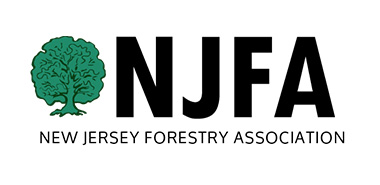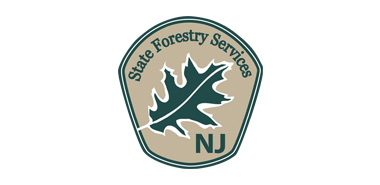The New Jersey Woodland Stewards Program (NJ WSP) is an educational program of the New Jersey Forestry Association and the New Jersey Forest Service. It promotes sustainable stewardship of our natural resources, focusing on sound, scientifically-based forest and wildlife management practices. A small group of individuals is selected and trained annually on the latest forest and wildlife stewardship principles. Once this training is completed, it is expected that these participants will apply these principles to forestlands they may own, and through volunteerism, actively encourage, teach and motivate others to adopt these stewardship practices to their forest resources.
The NJ Woodland Stewards Program provides outreach, education and leadership for the care and use of New Jersey’s forests to promote their ecological, social and economic benefits. New Jersey Woodland Stewards is a growing collaboration of trained volunteers and partners advocating sustainable forest management.
The mission of the NJ Woodland Stewards Program is to promote the sustainability of forest resources through a network of trained volunteers who are ardent about forest stewardship and charged with reaching out to New Jersey’s forest landowners, other stakeholders and the general public about the care and use of New Jersey’s forests for social, ecological and economic benefits.
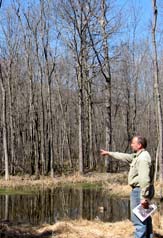 The purpose of the NJ Woodland Stewards Program is to train volunteers in the principles of forest stewardship, so they can share what they learn throughout the State. The training covers principles of stewardship, silviculture, forest and wildlife management, tree identification and measurement, forest ecology, financial and legal issues and outreach skills. In exchange for the forty hours of training, volunteers agree to a commitment to share their knowledge with others in their communities. The nature of the volunteer service is up to the individual NJ Woodland Stewards volunteer, with input from the Program leaders and/or the New Jersey Forest Service forester in their area. Examples of outreach activities include: talking to neighbors about forest stewardship; leading woodland tours; making presentations to organizations and groups – both adults and children; being active in woodland owners associations; and writing articles for local newspapers and newsletters. After volunteers complete training the Program will periodically contact them regarding updates, issues, publications and opportunities for further training.
The purpose of the NJ Woodland Stewards Program is to train volunteers in the principles of forest stewardship, so they can share what they learn throughout the State. The training covers principles of stewardship, silviculture, forest and wildlife management, tree identification and measurement, forest ecology, financial and legal issues and outreach skills. In exchange for the forty hours of training, volunteers agree to a commitment to share their knowledge with others in their communities. The nature of the volunteer service is up to the individual NJ Woodland Stewards volunteer, with input from the Program leaders and/or the New Jersey Forest Service forester in their area. Examples of outreach activities include: talking to neighbors about forest stewardship; leading woodland tours; making presentations to organizations and groups – both adults and children; being active in woodland owners associations; and writing articles for local newspapers and newsletters. After volunteers complete training the Program will periodically contact them regarding updates, issues, publications and opportunities for further training.
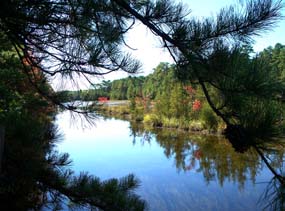 NJ has approximately 2 million acres of forest land. Slightly less than 6% are federally owned, about 47% are owned by state and local governmental units, and about 47% are privately owned. Forests represent a precious commodity that, if wisely managed, can generate a variety of ecological, economic, and aesthetic values to forest owners and their communities, generation after generation. Sound stewardship is necessary, however, in order to reap these benefits of our forest resources. Stewardship objectives involve management practices that ensure ecologically sound forest productivity and healthy forests. And healthy forests are essential for a densely populated and rapidly developing state such as New Jersey.
NJ has approximately 2 million acres of forest land. Slightly less than 6% are federally owned, about 47% are owned by state and local governmental units, and about 47% are privately owned. Forests represent a precious commodity that, if wisely managed, can generate a variety of ecological, economic, and aesthetic values to forest owners and their communities, generation after generation. Sound stewardship is necessary, however, in order to reap these benefits of our forest resources. Stewardship objectives involve management practices that ensure ecologically sound forest productivity and healthy forests. And healthy forests are essential for a densely populated and rapidly developing state such as New Jersey.
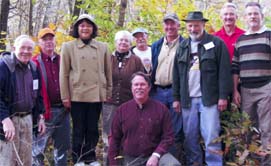 The NJ Woodland Stewards Program annually seeks applicants and nominations from consulting foresters, New Jersey state foresters, Extension personnel and current Woodland Stewards. Eligible individuals include woodland owners, managers of woodlands, educators, land trust representatives, land planners, active volunteers in other stewardship programs, and anyone interested in the stewardship of New Jersey’s forests and wildlife. Priority will be given to New Jersey Forest Stewardship Program members and forest landowners actively involved with managing their own woodlands. Primary selection criteria are that volunteers must be able to attend all sessions of the training workshop, and that they are willing and able to contribute outreach time toward the NJ Woodland Stewards Program educational outreach mission.
The NJ Woodland Stewards Program annually seeks applicants and nominations from consulting foresters, New Jersey state foresters, Extension personnel and current Woodland Stewards. Eligible individuals include woodland owners, managers of woodlands, educators, land trust representatives, land planners, active volunteers in other stewardship programs, and anyone interested in the stewardship of New Jersey’s forests and wildlife. Priority will be given to New Jersey Forest Stewardship Program members and forest landowners actively involved with managing their own woodlands. Primary selection criteria are that volunteers must be able to attend all sessions of the training workshop, and that they are willing and able to contribute outreach time toward the NJ Woodland Stewards Program educational outreach mission.
Each nominee will be given information about the Program, an agenda and an application. A Selection Committee will review the applications, formulate comments and rank them for selection. There will be opportunity to solicit input from consulting foresters or state foresters working in the applicant’s area. An offer of admission to the training program is extended to forest landowners who demonstrate a stewardship ethic, a commitment to promoting forest stewardship, and the means and willingness to educate through outreach.
A developed, three-and-a-half day agenda will be forwarded to each potential participant and followed each year. It will be reviewed annually by the NJWSP leadership and changed as necessary to best meet the educational needs of the Program.
Program instructors will be professionals selected for their expertise and experience from academia, the New Jersey Forest Service, New Jersey Fish & Wildlife, and other natural resource management professionals, agencies and organizations.
Ideal facility requirements include overnight accommodations and on-site food/meal preparation for 25-30 people; one large ‘classroom’ and at least one smaller ‘break-out room’; and a woodlot on the property large enough to use for measurement skills training and tree identification. At least one facility needs to be identified, although two to three appropriate facilities located throughout the state would be best. Potential facilities would include Boy Scout camps, YMCA camps, environmental education centers and possibly church camps. Proximity to Forest Stewardship properties or other actively managed forests would provide convenient field trip opportunities.
